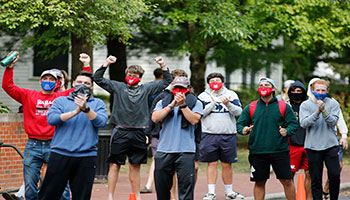Maintaining mental health in college is often a challenge in its own right, and in the midst of a pandemic, it’s especially important for students to pay close attention to their well-being.
Dr. Chris Bojrab ’89, psychiatrist and president of Indiana Health Group, the largest multidisciplinary behavioral health private practice in the state, has seen a rise in mental health concerns throughout 2020.
 “It’s a weird time between both the pandemic and the political atmosphere that we’ve been living through,” said Bojrab, who has worked with Indiana Health Group for nearly 24 years. “People are struggling.”
“It’s a weird time between both the pandemic and the political atmosphere that we’ve been living through,” said Bojrab, who has worked with Indiana Health Group for nearly 24 years. “People are struggling.”
During late June, 40% of U.S. adults reported struggling with mental health or substance abuse, according to data from the Centers for Disease Control and Prevention. A CDC survey found that 31% reported experiencing anxiety/depression symptoms and 26% reported trauma/stressor-related disorder symptoms.
Younger adults reported having experienced disproportionately worse mental health outcomes, increased substance use, and elevated suicidal ideation.
“There’s an awful lot of grief, a lot of loss, and a lot of frustration over the situation that we find ourselves in and our inability to do more about it and quickly,” Bojrab said. “That loss of control doesn’t help anything, and is hard for anybody to take.”
Even though it may be hard to recognize at times, Bojrab said there is still hope and plenty of resources available to help students address current mental health concerns. For example, students have access to the Wabash Counseling Center during the academic year and can arrange virtual or telephone visits.
Dr. Bojrab suggests these tips for ways to cope, improve mental health, and practice resiliency:
It may seem like a challenge at times, but it can help to be vocal with someone you trust – like a counselor, professor, friend, or family member – about your experiences, feelings, and mental health challenges. And if you notice someone else struggling, offer to talk and listen, too.
“The common theme you see over and over again is people thinking that they're the only one thinking or feeling this way, and then they start to talk to others and they're like, ‘Holy cow, everybody else is feeling the same way,’” Bojrab said. “That's oftentimes very reassuring and comforting.
“One thing that Wabash has always been pretty good at is fostering relationships,” Bojrab said. “I think sometimes guys are more willing to open up to one another than they might be in a different environment. Having that support system is a benefit and hopefully something students will recognize and take advantage of.”
When possible, don’t stay cooped up at home alone. Go outside, keep moving, and socialize to the extent possible.
Be sure to exercise regularly. And if there’s an appropriate event or a volunteer opportunity happening on or off-campus, attend and get involved.
“It's so easy to get wrapped up in all the things that we’ve lost or the things that we can't do,” Bojrab said. “Try to refocus on the things that you still can do.”
Physical activity and movement are great ways to relieve stress and have proven to reduce symptoms of anxiety and depression. While COVID-19 safety measures call for physical distancing from others, that doesn’t prohibit socializing when the appropriate precautions are in place.
Good nutrition positively affects mental health. A healthy diet consists of lean meats, fruits, vegetables, whole grains, and fat-free or low-fat dairy products. It’s also low in saturated fats, trans fats, cholesterol, salt, and added sugars.
Healthy foods boost energy, counteract the impact of stress on the body, and affect mood-related body chemicals, among many other benefits.
It’s also important to snack well and avoid skipping meals or over dieting.
“One thing that has been disrupted because of the pandemic is our sleep schedules,” Bojrab said. “So many of us are working remotely or virtually, and you don't have those normal demarcations of, ‘This is my work day or my school day, and this is my evening time.’ And so, it's easier for that stuff to drift, but it’s important to stick to a routine.”
Sleep deprivation can leave students feeling irritable and exhausted in the short-term, but it can also have serious long-term health consequences as well. Getting adequate sleep – at least seven hours each night – can help improve mental and physical health, reduce stress and improve memory.
 Limiting napping, establishing a nightly routine, avoiding caffeine too close to bedtime, and turning off devices, like cell phones, can help students get to and stay asleep.
Limiting napping, establishing a nightly routine, avoiding caffeine too close to bedtime, and turning off devices, like cell phones, can help students get to and stay asleep.
If something regularly stresses or upsets you, like watching the news or scrolling through social media, disconnect from it and take a break.
Instead, spend time doing things that make you happy or that challenge you to think critically and creatively. Concentrating on a hobby can help you forget the worries for a while, change your mood, and boost self-esteem.
“You have to stay positive,” Bojrab advised Wabash students, “and remember that things always seem worse in the moment than they are later on.”